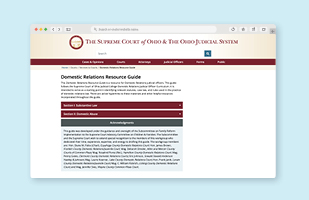Domestic Relations Web Tool Developed for Judges and Magistrates

The online Domestic Relations Resource Guide gives judges and magistrates quick access to statutes, rules, pertinent cases, and more.

The online Domestic Relations Resource Guide gives judges and magistrates quick access to statutes, rules, pertinent cases, and more.
A guide to domestic relations legal topics, such as child support, marital property division, and protection orders, has been restructured into a web-driven resource to better serve judges and magistrates.
The Domestic Relations Resource Guide on the Supreme Court of Ohio website gives judges and magistrates quick access to essential information organized by topic. They can scroll through the topics and find quick answers, whether on the bench, in their office, or elsewhere. The guide has links to statutes, rules, pertinent cases, and more. Because the guide lives on the web, it can be updated promptly and available immediately to users.
Judge Diane M. Palos of the Cuyahoga County Domestic Relations Court has bookmarked the guide webpage for quick reference wherever she is. Judge Palos, who chaired the 10-member workgroup that oversaw the reworking of the resource, said information in the Parenting section on awarding parental rights and modifying parenting orders has already been one of the most useful to her.
She explained that the law in these areas is some of the most challenging to understand, noting the importance of reviewing the cases that have interpreted the relevant statutes.
“Links to the seminal cases are included,” Judge Palos said. “Referencing the cases can focus a judge or magistrate on the evidence necessary and the standards of proof required in parenting cases, and offer a structure for decision-making.”
The judge also pointed to a chart on Ohio protection orders in the Domestic Abuse section. The chart identifies the different types of protection orders, who they apply to, the correct jurisdiction for each type, the standard of proof required, and what happens if the order is violated.
“This chart is invaluable not just to judges and magistrates, but also for other community stakeholders trying to navigate the complex system of protection orders in Ohio,” she said.
Throughout the guide, “Practice Tips” are highlighted in boxes. They’re cues to best practices.
“It’s like having your mentor whisper in your ear the answer to the question you are thinking,” Judge Palos noted.
The workgroup chaired by Judge Palos that helped develop the online guide is part of the Subcommittee on Family Reform Implementation within the Supreme Court Advisory Committee on Children & Families. The guide was modeled on the curriculum prepared by the Supreme Court Judicial College and is used during orientation for new domestic relations judges and magistrates.


